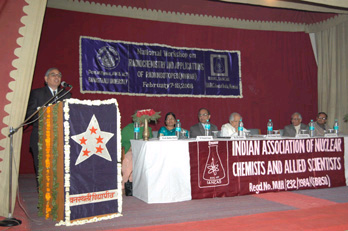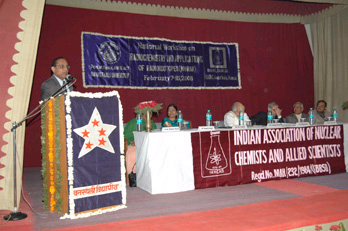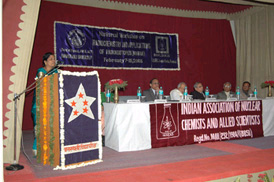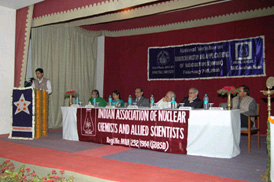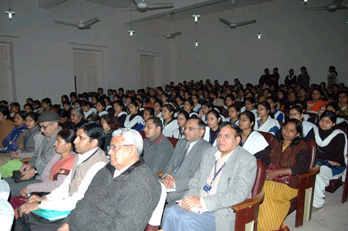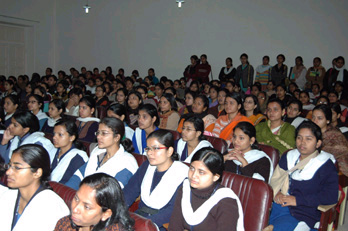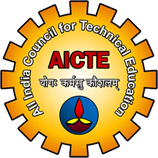News, Events and Announcements
Inaugural function of 66th IANCAS-BRNS National Workshop on Radiochemistry and Applications of Radiosotopes (NWRAR) on Feb. 7, 2008
Fri, Feb 8 2008
The 66th BRNS-IANCAS "National Workshop on Radiochemistry and Applications of Radioisotopes” (NWRAR) was inaugurated by honourable Prof. Diwakar Shastri, President, Banasthali University on Feb. 7, 2008. The workshop is being jointly organized by the “Indian Association of Nuclear Chemists and Allied Scientists” (IANCAS) and Department of Physics, AIM&ACT, Banasthali University during 7-15 Feb. 2008. The workshop is partly sponsored by Board of Research in Nuclear Science (BRNS), Department of Atomic Energy, Govt. of India. Prof. Rekha Govil, Dean, AIM & ACT and convener of the workshop welcomed all the resource persons from Bhabha Atomic Research Centre, participants and students who were present in a large number to witness the inaugural function. In her welcome address, she briefly introduced the Banasthali University.
In his talk on introducing the activities of IANCAS, Dr. V.K. Manchanda, President, IANCAS and Head, Radiochemistry Division, B.A.R.C. emphasized the need for energy in general and nuclear energy in particular. It was mentioned that per capita consumption of electricity in India is 1/4th of the world average and 1/10th of the developed nations. The advantage of the nuclear power lies in that it is a clean form of energy. It is economically viable and it gives a strategic leadership to the nation. Apart from expanding the energy base, the radioisotopes and radiations play a key role in a variety of societal benefit programmes. Large number of hospitals are using radioisotopes for diagnostic and therapy applications, new variety of crops have been developed using nuclear radiations, a radiation plant has been set up for sterilization of medical products, increasing shelf life of variety of food products and hygeinization of sewage sludge. Dr. Manchanda gave an account of the activities of IANCAS. The association celebrated its silver jubilee in January 2008 and has been playing an important role in popularizing nuclear science in general and discipline of radiochemistry in particular. Major activities of IANCAS include conducting national workshops, school/college workshops, publications of monographs and books related to Radiochemistry and Applications of Radioisotopes and publication of thematic bulletins on a variety of topics related to nuclear science. Dr. Manchanda also highlighted the activities of BRNS and DAE which can be of interest to students and teachers in academic institutions like Banasthali University. Shri S.K. Chande, vice-chairman, Atomic Energy Regulatory Board (AERB) discussed about the Indian nuclear power programme. He stressed that the safety standards of nuclear industry worldwide as well as in India are very high. He mentioned that whereas in the history of nuclear industry, there have been only 2 major accidents, one at Three miles island in USA and other at Chernobyl in Russia, in chemical and mining industry, there have been many more accidents during this period. However, the nuclear industry worldwide has further strengthened the safety standards and the regulatory aspects to ensure that this industry is safe as well as the adverse impact to the environment and the society is minimal. Shri Chande was very appreciative of the culture developed in Banasthali in the staff as well as the students. Before the inauguration, Dr. Veena Sagar, scientist from B.A.R.C. and co-coordinator for this workshop described the workshop programme. The workshop will have lectures by eminent scientists from BARC in the morning sessions and practicals in the afternoon sessions. There will be 5 special lectures on topics such as Safety of nuclear power plant, DAE activities at a glance, Applications of Radioisotopes for the societal benefit, nuclear waste management and production & Applications of Radioisotopes in Industry. The workshop course will be covered in lectures on topics which include the basic aspects of radioactivity, nuclear stability and structure, interaction of radiation with matter and radiation detection and measurement. The experiments include working with GM counter and NaI(Tl) gamma scintillation counter. In batches, the participants will perform all the experiments which include determination characteristics of GM counter, gamma spectrometry, half life determination, separation of 234Th from 238U, solubility of sparingly soluble salt, isotope dilution method for determination of iodine using 131I tracer, Radioimmunoassay technique and measurement of radioactivity in air. After demonstrating the performance of these counters, both counters along with some sealed sources will be donated to the host institute. All the participants are given one book each on “Fundamentals of Radiochemistry” and “Experiments in Radiochemistry”. She also added that in addition to the main workshop programme, there will be lecture cum demonstration programme for the students of 11th, 12th and B.Sc./M/Sc. Students which will be conducted in parallel sessions. She is associated with this work since 1993 and has conducted several school/college workshops, which are conducted on requests from the institutions and only on non working days of BARC. Prof. Diwakar Shastri encouraged the participants by giving his blessings for a successful conducting of the workshop. At the end, Dr. Vimal Vyas, secretary NWRAR gave vote of thanks. Schedule of the Workshop (NWRAR)
Glimpses of Inaugural function of NWRAR
Prof. Diwakar Shastri, President Banasthali University with Lighting of lamp by Prof. Rekha Govil and
Presidential address by Prof. Diwakar Shastri, President Welcome address by Prof. Rekha Govil
Dr. V. K. Manchanda, President IANCAS, addressing Inaugural address by Sh. S. K. Chande, Vice Chairman,
Dr. Veena B. Sagar telling the workshop schedule Vote of thanks by Dr. Vimal Vyas
Audience in the inaugural session Participants of the workshop and Banasthali Students
|








